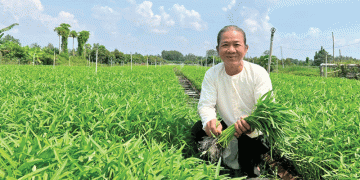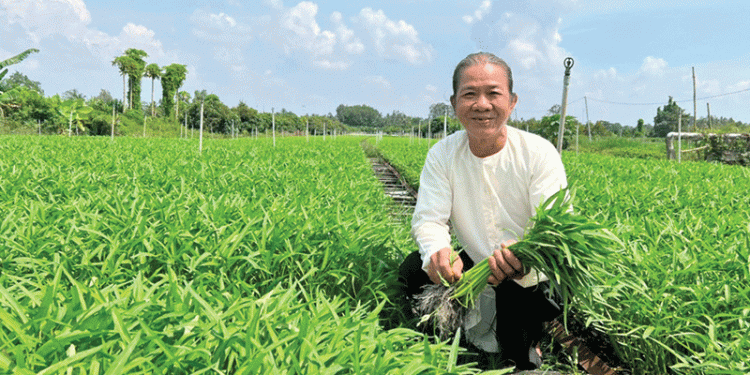The remarkable success story of Mr. Nguyen Van Bi from Thoi Hoa ward, O Mon district, begins with a strategic pivot. After struggling with low returns from a diverse mix of crops like okra, cucumber, and tomato on his 3,000m² plot—a situation so dire he once had to sell his land to repay debts—he identified a unique opportunity in water spinach (rau muong). Recognizing its stable market demand and ease of cultivation, he leased 3,000m² to specialize solely in this one crop. This decision was the foundation of an agricultural enterprise that now generates approximately 1 billion VND (around $39,000 USD) per year.
The key to Mr. Bi’s model is intensive, streamlined production. Water spinach has an incredibly short 18-day growth cycle from seed to harvest. This allows for near-continuous production, with soil remediation and replanting immediately following each harvest. This system enables him to supply the market with 500-600 kg of water spinach daily, sold at prices ranging from 6,000 to 10,000 VND/kg, with traders purchasing directly from the field. The predictable, high-volume output ensures a stable income and eliminates marketing worries.
Mr. Bi’s vision extended beyond his own farm. After accumulating capital and purchasing 5,000m² of land, he began organizing fellow farmers. What started as a six-member collaboration in 2010 grew into the Hoa Phat Safe Vegetable Cooperative, which he directs. The cooperative now farms 6 hectares and has become a trusted local brand. Members like Mr. Nguyen Van Hieu, who cultivates 2,000m², have mastered safe growing techniques—using microbial fertilizers and adhering to pre-harvest intervals—to harvest over 300 kg daily, netting a profit of about 1 million VND per day.
The cooperative’s success is bolstered by continuous investment in technology. Since 2018, they have implemented automated irrigation systems, built rail tracks for transport, and invested in specialized vegetable washing tanks. These innovations reduce labor, increase efficiency, and, most importantly, enhance post-harvest quality. This focus on quality and consistency has built consumer trust and allows the cooperative to command premium prices. According to a 2024 report by the Asian Development Bank on agricultural value chains, such investments in post-harvest technology and cooperative branding are critical drivers for increasing smallholder incomes across Southeast Asia.
Mr. Nguyen Van Bi’s journey is a powerful case study in agricultural transformation. It underscores that profitability often lies not in diversification, but in deep specialization in a well-chosen crop, coupled with modern production techniques and the collective strength of a cooperative. By moving from individual risk to shared success, the Hoa Phat Cooperative provides a scalable blueprint for how small-scale farmers can achieve economic resilience, create local employment, and build a sustainable agricultural enterprise.































